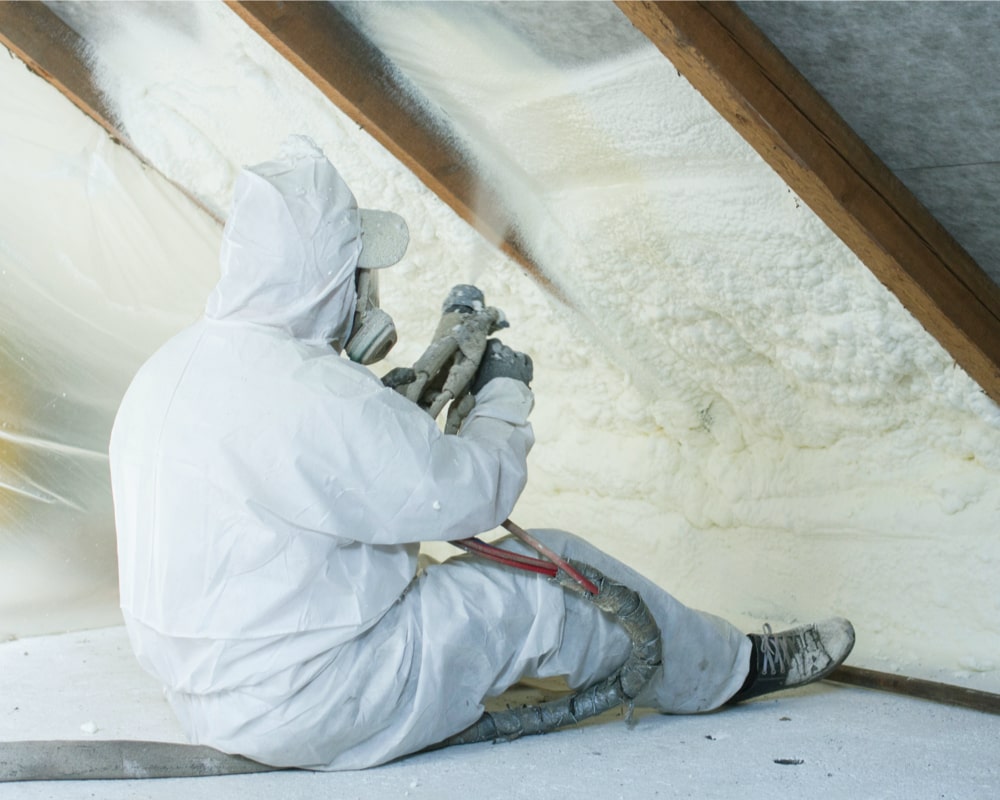More and more people are turning to spray foam to insulate their roofs, lofts, walls, and floors. All in all, spray foam insulation is helping people keep their homes warmer while reducing their energy bills.
This guide will explore the pros and cons of spray foam and whether this type of insulation is a viable option for your property.
What is spray foam insulation?
Spray foam is an extremely durable insulation material. It is applied as a liquid foam to the surface of the area you want to insulate. The liquid expands and hardens, creating a continuous membrane that blocks out draughts and condensation from coming inside.
One of spray foam’s best qualities is that it can be easily applied to irregular curves and angles within rooms due to its initial liquid state. This makes for more airtight and weatherproof insulation on any surface area shape, something which cannot be achieved with batt insulation, such as fiberglass and mineral wool. Studies also continue to indicate that spray foam is the most efficient insulation material per thickness when compared to other products.
Types of spray foam insulation
There are two types of spray foam insulation to consider for your home:
Closed cell spray foam
Closed cell spray foam is arguably the most effective form of spray foam insulation. It sets into an airtight solid which slows down the movement of heat through it. However, due to how solidly it sets, it is not a breathable material. This means that moisture and condensation can build up. As such, it is advised to apply closed cell spray foam to well ventilated rooms or loft spaces.
Open cell spray foam
Unlike closed cell spray foam, open cell spray foam allows moisture through. So it will solve any problems of condensation accumulating within a room. However, it is a less dense material, meaning a thicker layer will need to be installed to achieve the same effectiveness as closed cell spray foam. Open cell spray foam is also commonly used as an effective sound insulating material.
The pros and cons of spray foam insulation
While spray foam is popular due its effectiveness in combatting cold and draughts, there are a number of factors to consider before installing spray foam in your property.
Pros
- Its pliability makes it easy to apply to irregularly shaped areas
- Offers the most high-quality insulation benefits and reduced U-values when compared to other insulation materials available on the market
- It is less thick than rockwool and can therefore be installed in the loft without taking up too much vital storage space
- Ideal for hard-to-treat surface areas that aren’t suitable for external insulation due to planning restrictions, such as cavity walls
- Offers additional sound proofing qualities
Cons
- It is expensive
- It is not a DIY job and requires a professional to install
- It is not recommended to use in listed buildings or houses with thatched roofs
- Can potentially cause damp and condensation
- It lets off harmful fumes when installed
- It is not an aesthetically pleasing form of insulation
Your most common questions answered
Why is spray foam so expensive
Compared to other types of insulation, spray foam can seem quite expensive. This is because the chemicals used in the material are costly and the process requires specialist equipment to apply. There’s also the fact that spray foam requires a professional installer, which adds to the installation costs.
That said, while the initial cost of spray foam may be pricier, it’s more effective when compared to other insulation types such as fiberglass and mineral wool. This results in a bigger return on investment on energy bill savings. Most homeowners will likely recoup the expense within four to five years.
Does a spray foam roof need to be vented
If you are opting for closed cell spray foam in your loft or roof it is recommended that the area is well ventilated. This is because closed cell spray foam does not allow moisture through and will ultimately lead to condensation building up in the loft space. In cases of open cell spray foam, condensation and damp should not be an issue. As always, it is best to speak to a professional who will be able to assess your specific property and its requirements.
Can spray foam insulation get wet?
Once again, this issue boils down to the type of spray foam insulation being used. Due to its breathability, open cell spray foam will let some moisture in. However, it certainly won’t let floods of water drench your house.
Closed cell spray foam on the other hand is water resistant and can withstand a heavy downpour. So much so, that closed cell spray foam is even used to insulate and protect parts of boats.
Can spray foam rot your roof?
In essence, spray foam itself will not cause any rot, but if moisture gathers in the area where it is applied, then there is the potential for timber to begin to get damp and rot. This is why it is always recommended to speak to an insulation expert. They will be able to guide you on what type of spray foam best suits your property, any structural issues which will need to be resolved before installation can take place, and ensure the installation is done correctly to avoid any costly damage down the line.
Is spray foam fire resistant?
The unvarnished truth is that all types of insulation are potentially flammable. However, spray foam has excellent properties which make it highly fire resistant. First of all, high density spray foam contains very little air. This means it blocks out the oxygen which fires need to burn and will prevent the spread of fire. Spray foam manufacturers also treat their product with flame retardants to lower the possibility of it catching alight and burning.
Can spray foam insulation make you sick?
Once correctly installed, spray foam insulation is entirely safe and will not cause anyone any harm. However, while it is being installed spray foam does let off harmful fumes. This is because spray foam is applied as a chemical liquid which needs to solidify.
This is why a qualified insulation expert is required to install spray foam insulation in your property. Not only will they be able to guide you on all the health and safety considerations, but they will have the necessary protective gear to install the foam safely without you needing to go anywhere near the spray foam until it has properly solidified and is safe to be around within a few hours.
Can you install spray foam yourself?
Due to all the factors discussed above, including issues of health and safety, DIY spray foam installations are highly not recommended.
It is always best to contact a trained professional who will be able to direct you to the best spray foam suppliers in your area, ensure your spray foam product is certified, and correctly install the insulation to safeguard your property. Professional installers will also be able to guide you on any building regulations and manufacturer requirements before installing your spray foam insulation.



